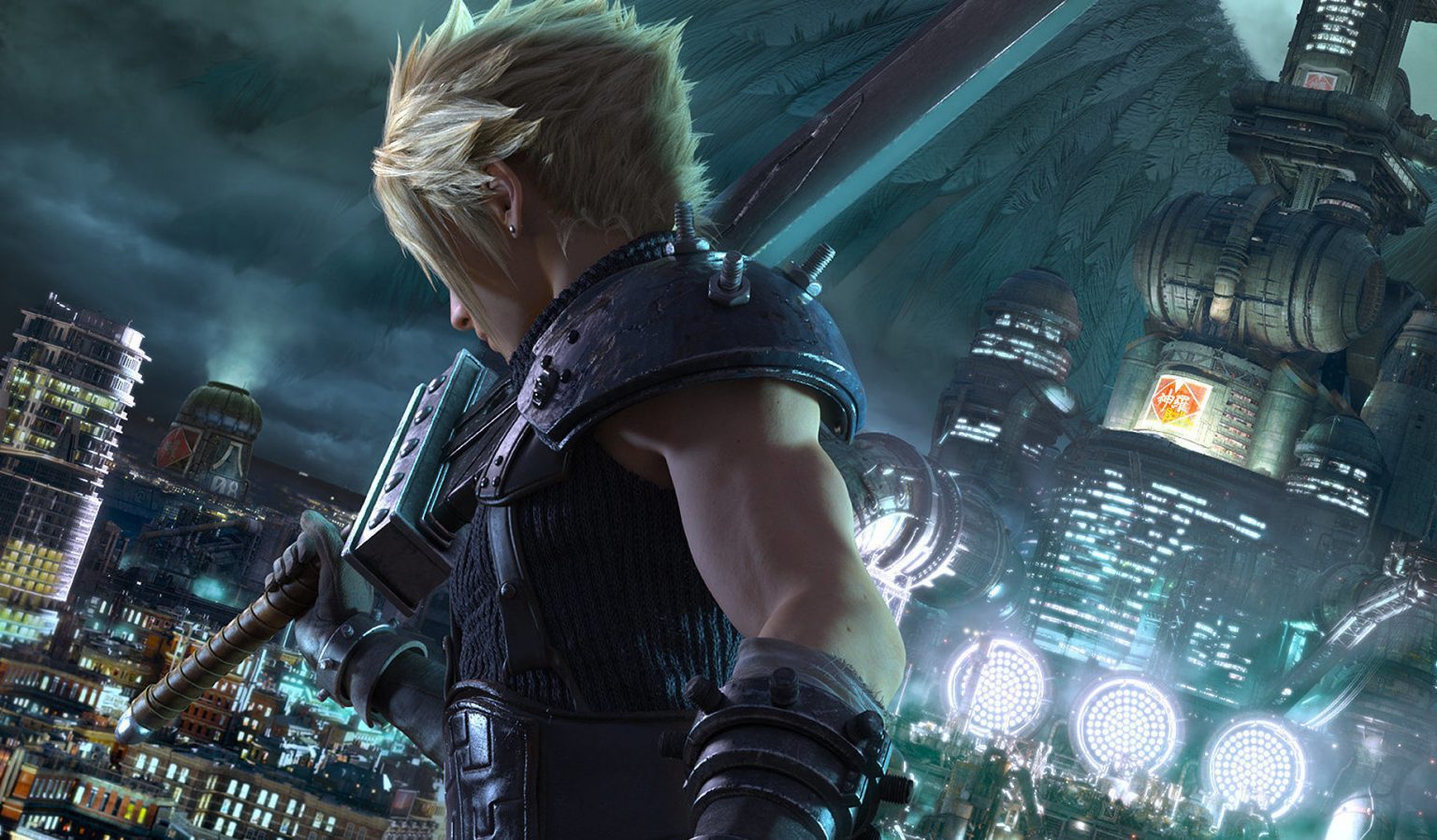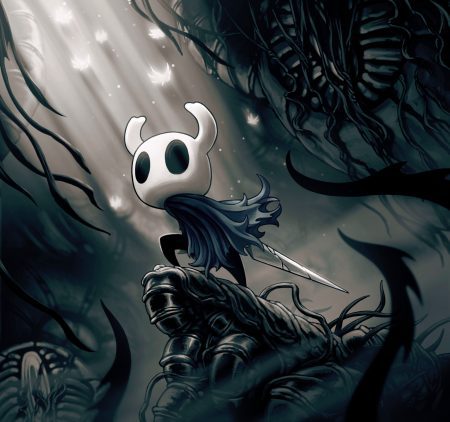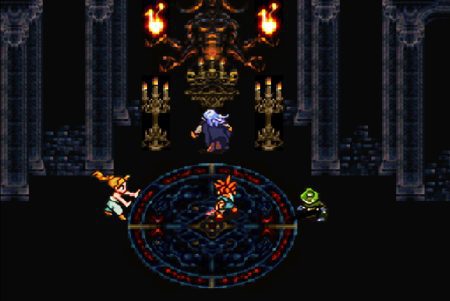From Ni no Kuni to Bravely Default, a Discourse on JRPGs
It’s no secret that I have a complicated relationship with Japanese role-playing games, but I do find their presence and importance in the video game medium to be fascinating and worthy of much debate. In this first edition of “Punished Chat,” a new series where I talk to friends about various video game related subjects, I discuss the JRPG genre with Alexander Toy, a lover of JRPGs and The Bachelor.
Sam Martinelli: You and I have a lot in common in terms of games we like and don’t like, except this genre… well, this isn’t the only one, but this is the BIG one.
Alexander Toy: Yeah.
S: The 3D Mario games are another big one.
A: I don’t care for them.
S: Well I think they’re great!
A: I thought Galaxy was good! Just not really the rest of them… But that’s a different recording.
S: We can definitely do that another time.
A: Let’s hear me complain about Mario!
S: I want to get into JRPGs, and I think we should figure out and define what we mean by that, because technically Bloodborne is a JRPG.
A: No it’s not, that’s trash. That’s a lie. Get out of here.
S: But it’s a Japanese company made by a Japanese auteur!
A: It’s not the same, it doesn’t fit the mold. When I think of JRPGs, it’s got to be Japanese…
S: Like culturally Japanese?
A: Not exactly. It can be set in a Western-themed universe. But I also think that two of the things that define the genre are character stats and then… I struggle with this one. I think turn-based combat is important.
S: See that’s one of the things: I’d say generally yes, with certain exceptions.
A: Like, Ni no Kuni II is still a JRPG even though its combat isn’t turn-based.
S: Or the recently announced Astral Chain, but that looks a lot like Bayonetta gameplay-wise.
A: See, I don’t consider that a JRPG, in the traditional sense. It’s more of an action RPG, or ARPG. People say that, right? That’s a thing, right?
S: Here’s an opinion of unknown popularity: The term RPG is just so broad. I just played Batman: Arkham Asylum recently. It’s a great game, and technically you are playing a role of one character that you get to customize as you level up throughout the game. Even though it’s a linear game, even though you’re Batman, you can’t choose to be a different person, you don’t have a party, it still has some of those RPG elements. With JRPGs, they’re much more rigid that way.
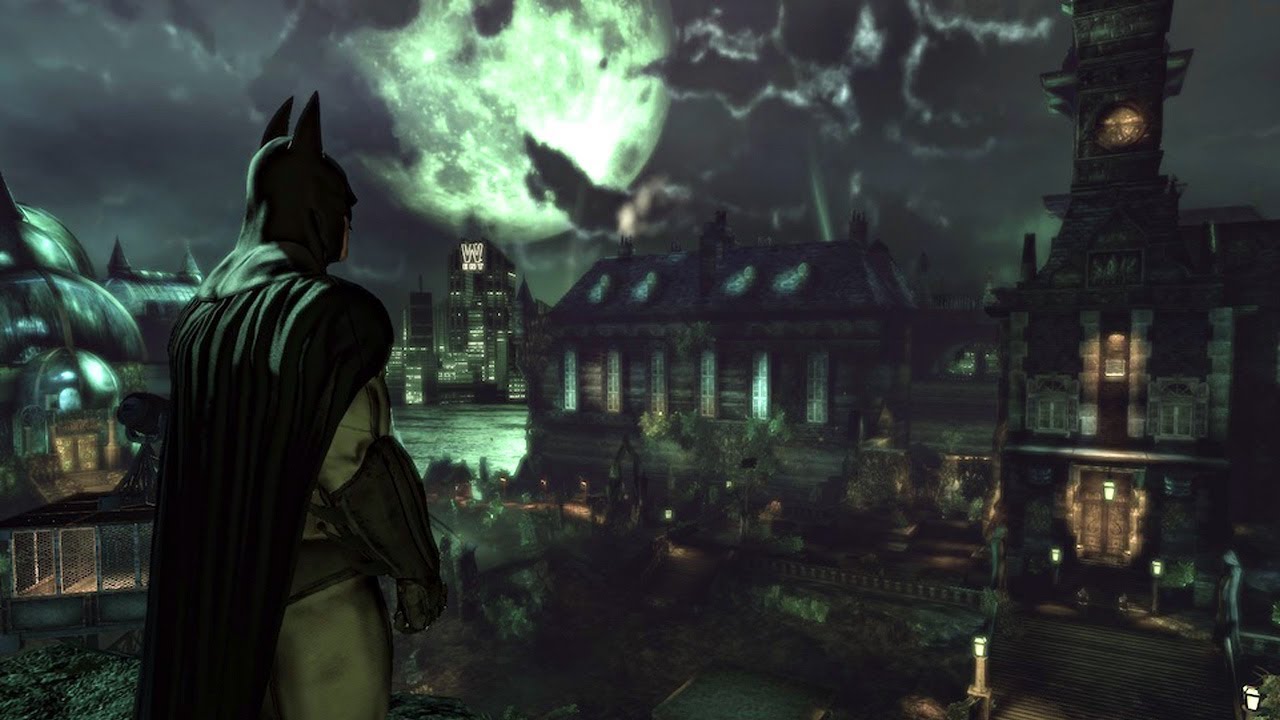
A: I think that a lot of games that came out in the last five years or so, a lot of AAA games borrow a lot from RPGs. I’m thinking a lot of the last two Assassin’s Creed games: the amount that they draw from The Witcher 3, it’s obvious and even a little embarrassing. Breath of the Wild draws a lot of inspiration from RPGs. The way that it handles eating and quests, it’s like a JRPG without the turn-based mechanics.
S: How about we go through some examples of what we mean when we talk about JRPGs. I recently played Chrono Trigger, which some say is the quintessential example. Last year, when I got the SNES Classic, I finally got to play Mario RPG and Final Fantasy VI. What are some other examples of what we’re talking about?
A: For me, one of the biggest examples I think of is the entire mainline Pokémon franchise, because it’s not traditional in the way Final Fantasy is, but it’s damn close: turn-based combat, a lot of customization–
S: But it doesn’t have the depth of customization that Elder Scrolls, for example, does, where you create what you look like and what your entire story is. [Pokémon] has a specific story and tasks you have to perform.
A: That’s true of most JRPGs. Most are incredibly story-driven, but without direction, which is why I think about the Mega Man Battle Network series.
S: What a weird series!
A: I fucking love Mega Man Battle Network.
S: I never played the games, but everyone I know who did remembers them fondly.
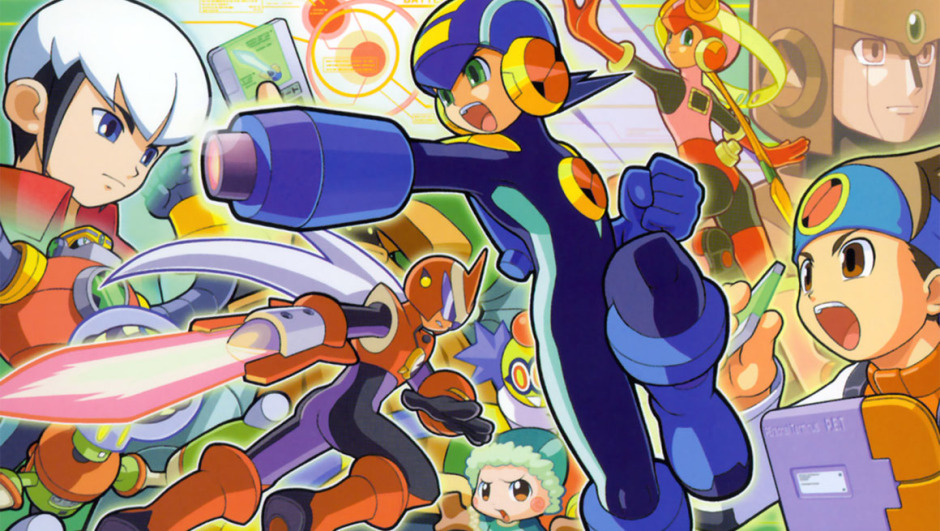
A: One of the best features of the game was that at any point you can tap the L button and Mega Man will tell you what to do. Like, “Did you forget that you were supposed to go meet Mr. flisehfeh at school?” I miss that feature in other JRPGs that I play, because it’s so easy in these games to get really distracted. You could be grinding for a very long time and kind of forget what you’re supposed to be doing.
S: That’s what I appreciated about Chrono Trigger. There’s very little grinding in that game, but in the two or three cases where I actually did have to grind, you could grind right outside of the main boss. For example, when you first fight Magus, there are tons of bats right outside where you fight him. The scenario is deliberately created so that there’s a save point, a staircase with bats to kill, and then the boss. So if you spend, like, twenty minutes killing all the bats, you’ll level up like crazy. So at least I don’t get off track here.
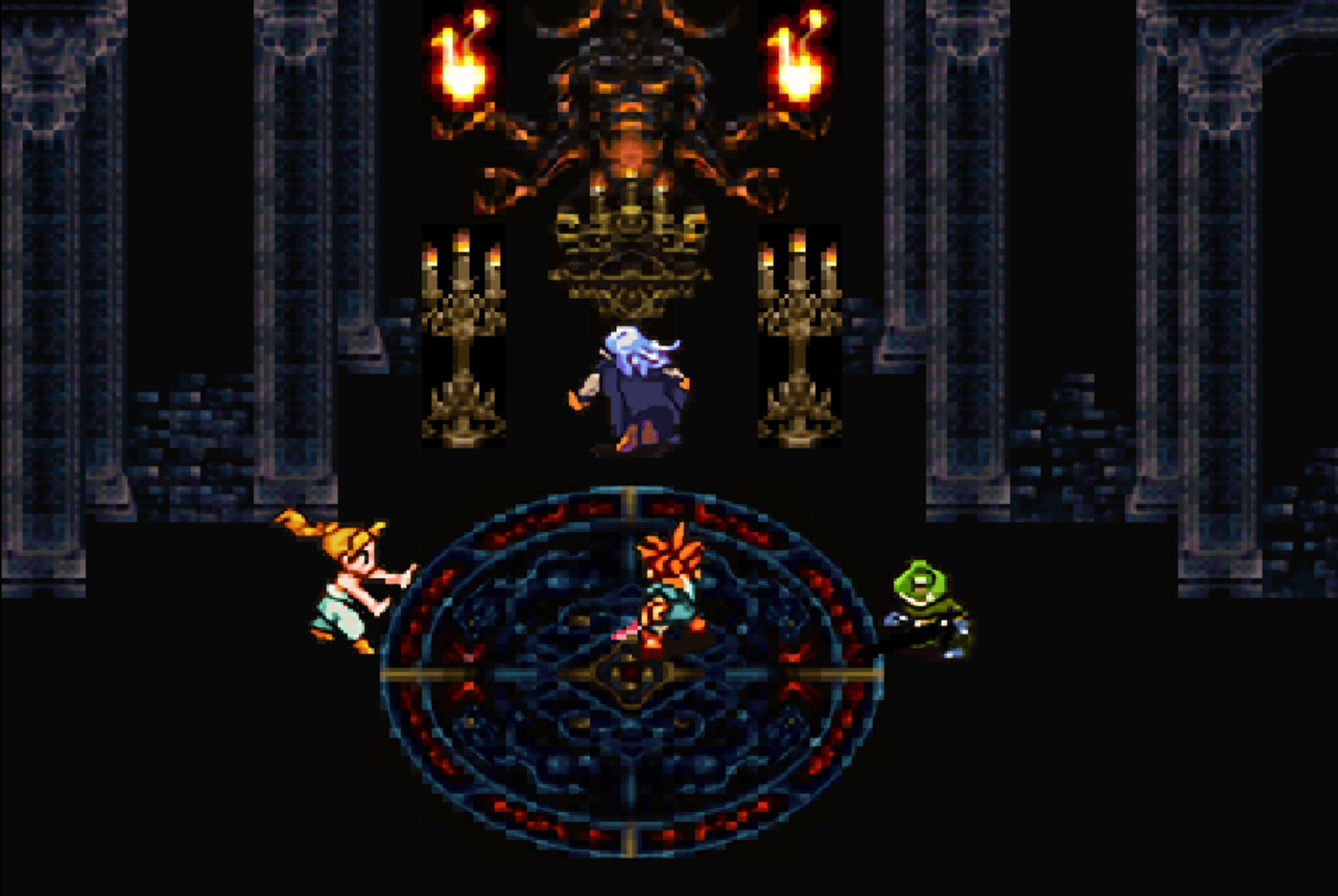
But when we talk about some of these examples, here’s one of the problems I’ve had with the genre and why it’s hard for me to get into it now: These games want you to have this big, broad narrative with tons of characters and tons of stuff going in, except the experience is also very rigid. You have to watch every cutscene. You have to read every line of dialogue. You have to level up a certain way. And they pad it with random encounters or grinding, where the only way they can make sure the story is at least 30 or 40 hours is by artificially making the game longer than it has to be. And that’s the main difference between basic JRPGs and games like, for example, the Zelda games, where you can beat basically any Zelda game in under 20 hours if you’re smart enough and you know what you’re doing, but the game doesn’t make you play longer than that if you don’t want to.
A: I think a lot of modern JRPGs, and I’m thinking specifically of Persona 5 and also Final Fantasy XV, do a really good job of not doing that. Don’t get me wrong: FFXV is still a 50-60 hour game. It’s a really long game. But there’s no point in the game where you just have to go into the woods and kill monsters for no reason. You can gain levels by picking up side quests and killing monsters, but there’s a reason for that: You’re doing a quest. You’re not just wandering into the woods like you do in other JRPGs and killing boars.

S: That brings up the next thing I wanted to talk about: Just how different these RPGs are from, I guess you would say, Western RPGs. I’m more into those games, even though I do have a lot of problems with them. Like, I never got into Dragon Age or Mass Effect, or even any of the isometric games from the 90s like Baldur’s Gate. But I can definitely get into Fallout, for example. Fallout 3 makes it so that the main way to level up is by doing quests, but they put more effort into the side quests than the main quests, and I do not believe that is true for most JRPGs.
A: No, I agree with that. Again, with some exceptions, like Persona 5.
S: But, for example, in Chrono Trigger, before you’re supposed to fight Lavos at the end, every character has a major side quest you can do, but if you don’t do them, you’ll be so under-leveled and won’t have the best equipment. So those side quests are effectively main quests because you pretty much can’t complete the game without them.
A: One of the things I’ve been thinking about over the past few days is how much JRPGs draw on not necessarily Western RPGs, but how much they reflect tabletop role-playing games. Turn-based combat, statistics, etc. That’s part of the reason I like RPGs so much: they remind me a lot of playing D&D but I don’t need to have friends. I don’t need to have other friends to play this.
S: And I think western RPGs try to capture the world-building of D&D, but maybe not the mechanics. Like how in Skyrim, you can just click the trigger a bunch of times to swing your axe and eventually you’ll kill something.
A: I think with JRPGs, there’s a level of patience you have to have. You have to be willing to sit through a slog of grinding, cutscenes, and the king telling you for the 50th time that you’re the chosen one to stop the evil monster thing. Whereas Western RPGs draw more on what is stereotypically American. They draw more from action games, action movies, first-person shooters. I’m thinking Skyrim, Fallout, Mass Effect: They’re all very fast-paced games, they draw heavily on stories about war, they’re all dark, they’re all gratuitously violent. Western RPGs are almost a stereotype of America, even when they’re not made in America.
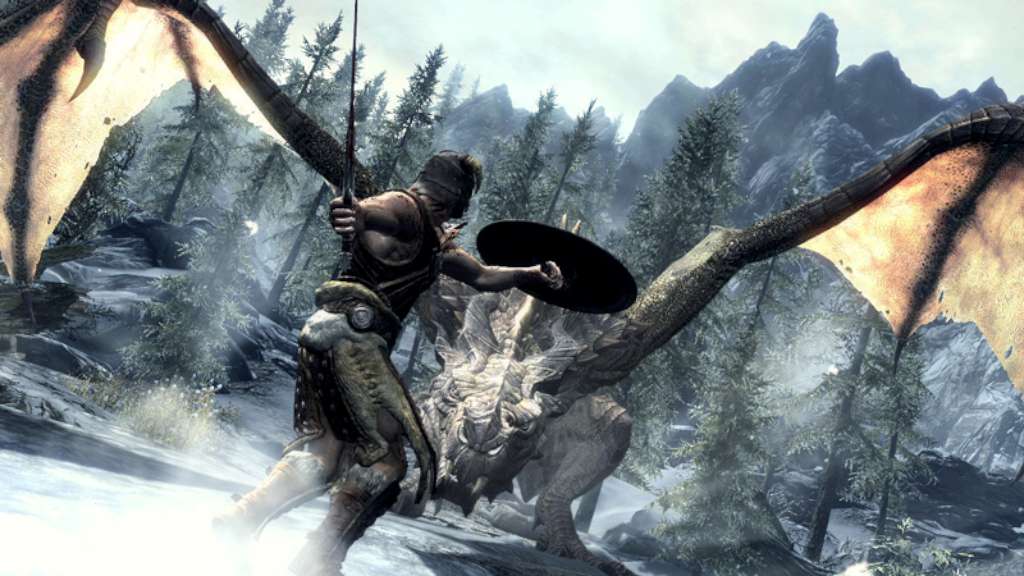
S: You talk about patience… One of the reasons I’ve had a hard time with a lot of RPGs is that I grew up playing platformers, shooters, action games, racers — games that are supposed to feel good and supposed to be done relatively quickly. If I turn on my Super Nintendo, I can be done with a level from Super Mario World in a couple of minutes. I don’t have to sit down and wait and find a save point later. I just pick up and play and that’s it. The same is true if I want to play one round of an online shooter like Halo or Apex Legends. That’s not a big commitment, and most JRPGs just don’t respect your time very much. Even when they’re good, they still say, “No, you have to play it this way.” I do think, though, that with technological advancements like quick saves or more save points… like Final Fantasy VI was impossible for me sometimes because you have to find this very specific spot and THEN pause to save.
A: One of the things that’s helped with that is basically every modern console has a sleep function.
S: And if you play older games on modern platforms, like playing Chrono Trigger on Steam, I can bookmark my progress anywhere in the game.
A: That’s why I don’t like Kingdom Hearts 3 as much as I wanted to, because it still holds on to old systems like save points. Fuck save points! Save points are stupid.
S: Especially now at our age (Author’s Note: Sam is 28 and Alex is 25) where we have to go to work, we have responsibilities. We don’t have time to play video games for six hours in one sitting.
A: It’s 2019. Just let me save wherever I want. It’s not hard.
S: It’s not! It’s actually very easy!
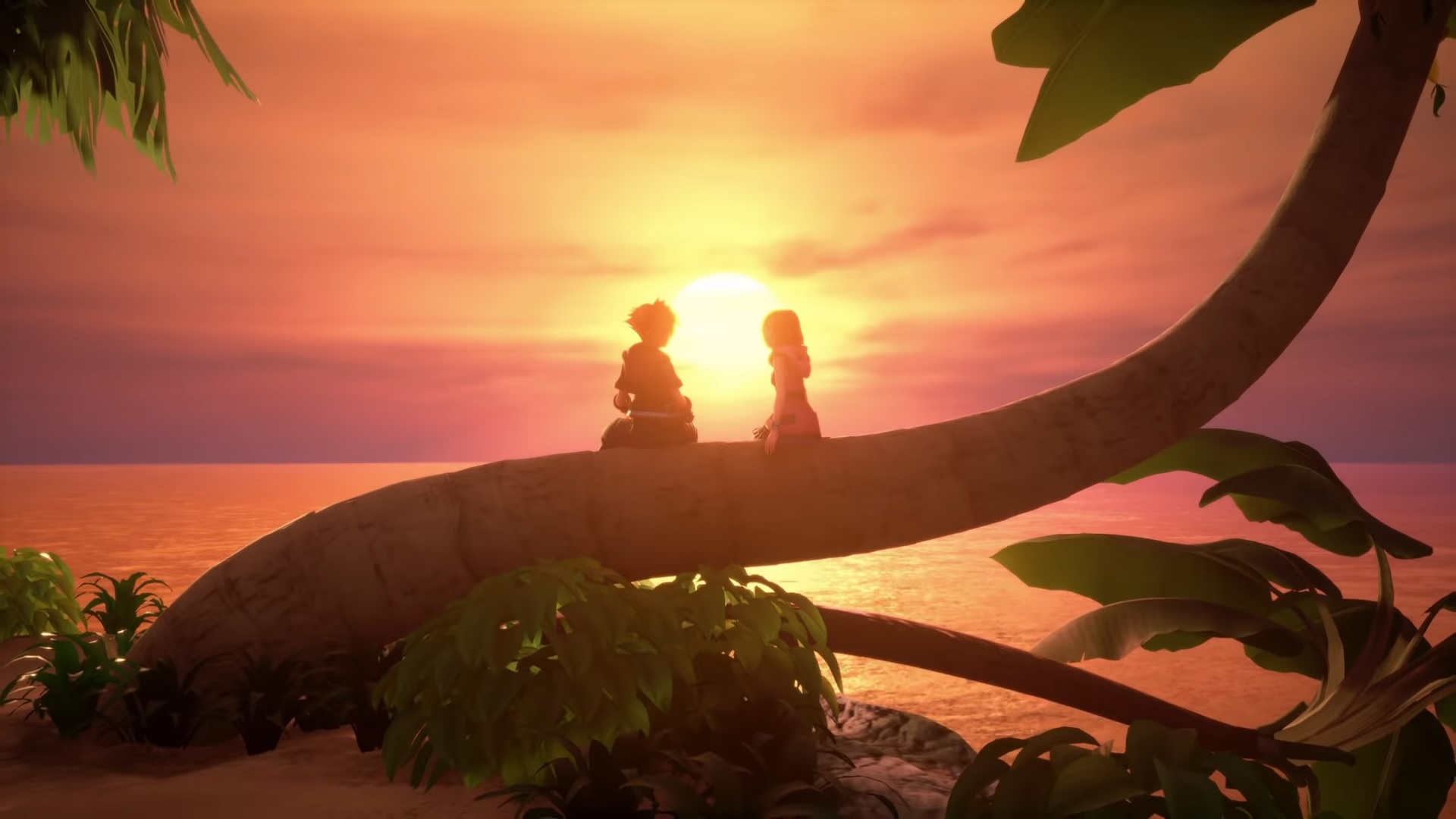
A: I have a lot of issues with Kingdom Hearts 3, and we don’t need to talk about all of them. But that’s one of the biggest ones: The last game in this series came out fifteen years ago, and they’re still making me use save points in 2019.
S: Let’s go into another topic: I would love to air more of my grievances about JRPGs.
A: Please, grieve!
S: One thing I wanted to mention from my list of grievances is that these games are just so overwrought. There’s just so much of it. When I tried to get into Ni no Kuni II, for example, I actually liked the first four hours of it, but it kept adding too much stuff to do and too many mechanics I didn’t care about. That’s my general complaint about video games now is that most companies try to do too much. Everyone wants to make something that’s everything to everyone, but as a result you’re nothing to no one.
A: I can respect that.
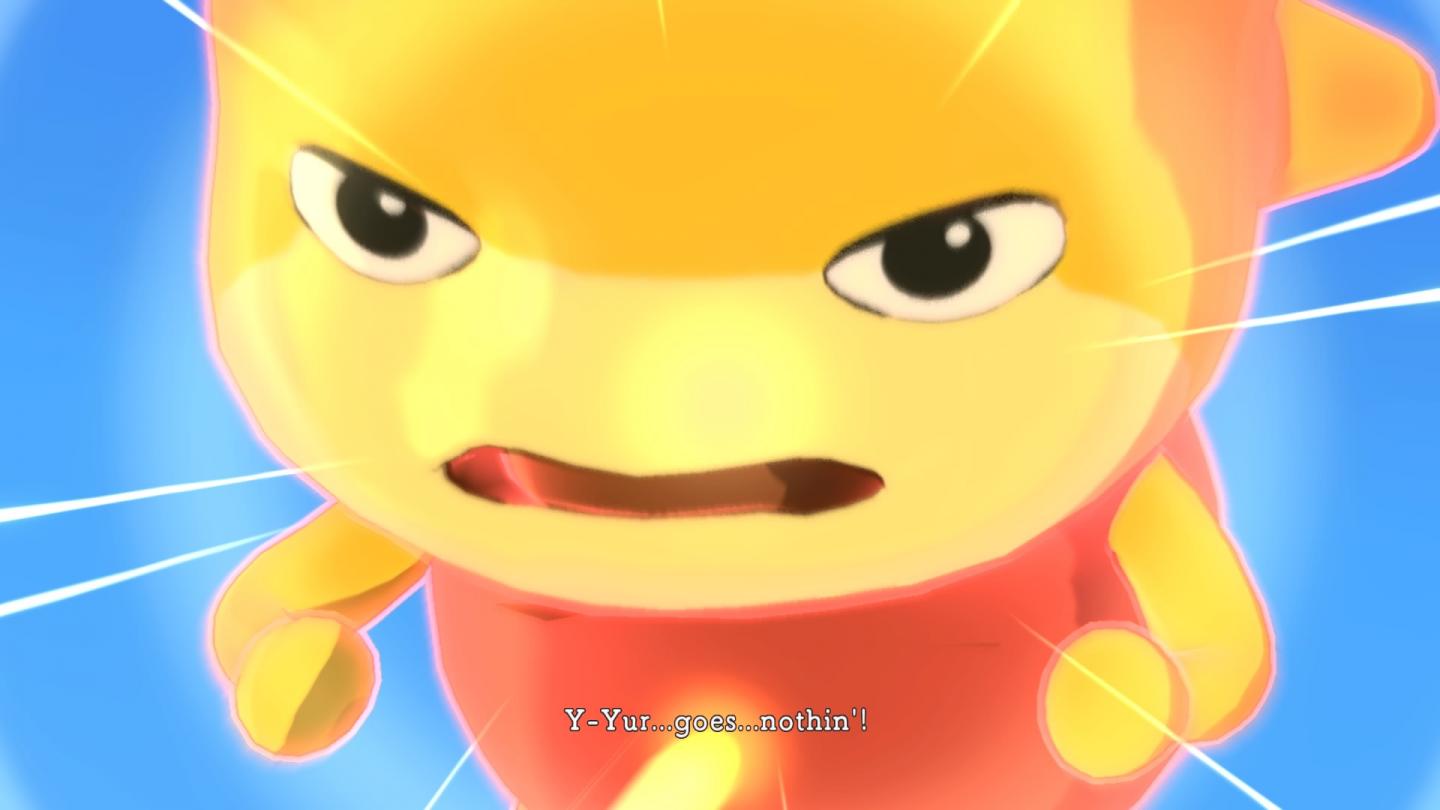
S: And that’s why I often prefer a really good three-hour indie game, like Bloodstained: Curse of the Moon, where it’s not trying to be anything more than a well-crafted Castlevania knock-off. With JRPGs, every time I think, “Oh this looks cool!” I check howlongtobeat.com to see that the main story without side quests is nearly 100 hours long, and that’s way too long. That’s unacceptable in my book. If I took any my favorite games ever, if the main story was more than 40-50 hours long, I’d still think that was too much.
A: Persona 5 took me somewhere between 150-200 hours to beat. Which is outrageous, but every single action in that game is justified. There is no point in that game where I’m just futsing about. The game is extremely linear, which I usually don’t like, but that game has a system with daily actions where you try to be a very good Japanese teenager, which also involves fighting demons. But the story is, for the most part, always progressing forward, regardless of what you’re doing. Even if you want to avoid fighting monsters and just eat burgers, sure you’ll be under-leveled later, but the game gives you that choice.
S: So, I guess as long as everything has a place that length can be justified. As long as it’s not 80 hours of walking through a forest looking for little slimes to kill.
A: Exactly! I don’t have time for that. Dragon Quest XI does a pretty good job of cutting that out. You get a horse in DQXI right as soon as the world opens up to you, and when you ride the horse fast, you can ignore random encounters. You’re making a choice to not engage in these fights, which may force you to grind later. That still isn’t great, but it’s still a choice that you’re making.
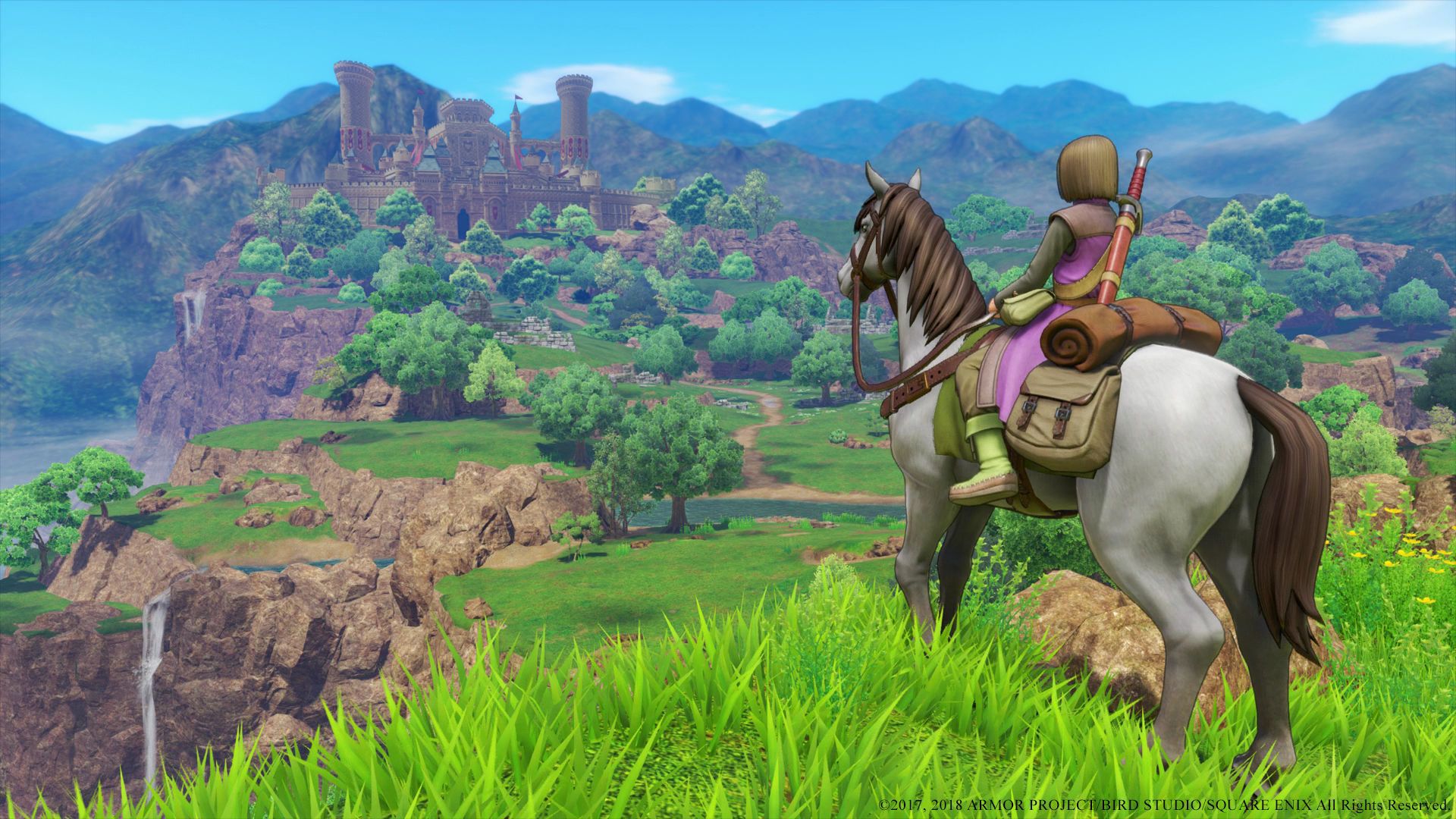
S: That’s part of the influence of Western RPGs: player choice. I think, however, that the notion of player choice can be fraudulent. Like, in Fallout 3, you have a choice to make early in the game to blow up a town or not, which is stupid, unless you just want to be the bad guy. Just don’t blow up the town! It works, though, in a game like The Witcher 3, where you honestly don’t know whether your decisions are good or bad until you see the outcome later. I think that’s what good RPGs do, and I think a lot of JRPGs basically tell you that you have to play it their way.
A: I’m going to reinstall The Witcher 3 right now.
S: Good call! Back to my original point of how these games are overwrought: They’re always trying to tell the next big fairy tale, the next big grand story. It reminds me about how one of the masterminds of Destiny wanted to create the next Star Wars.
A: That’s silly! Even not knowing Destiny, that’s a silly thing to say.
S: Right, and I’d argue Destiny didn’t exactly achieve that status. But I do think a lot of people who create RPGs are thinking the same way. They want to create the next big epic story and it’s really hard to do that without being over-dramatic and having a lot of bad, silly writing. It’s hard to strike a balance where everything in the game matters but also have it be entertaining. I mean, one of the big game moments in Ni no Kuni II early on involves your cartoonish kingmaker throwing a booger to alter the outcome of a die roll.
A: That game was weird. And I love it.
S: But that’s the thing! That’s the biggest disconnect we have here. You look at that and go, “That’s great! I like that!” and I go, “Fine, but the whole game has to be like that.” Like, when you play old Rare games like Banjo-Kazooie, the whole game is stupid and ridiculous, but it never once tells you it’s trying to be something else. I think some of these JRPGs are trying to be both both silly and serious all at once, and it doesn’t always work.

A: I can get behind that. There’s a running joke in the industry about, like, how many Final Fantasies can you have? The name suggests an end. Anyway, all these stories are huge and grandiose. But that’s just a staple of the genre. If you play a lot of JRPGs, it’s what you’re used to at that point. I don’t want to make it all about Japan, but I read a lot of anime growing up. After a certain point, I felt like all these series felt the same at the end: DBZ, Naruto, Yu Yu Hakusho. They all felt pretty similar at a certain point. I feel like JRPGs get into the same hole, where you keep trying to build on previous franchises but you can only escalate it so far without getting ridiculous.
S: We also keep changing the standard of what “ridiculous” is.
A: That’s why Dragon Ball Super exists.
S: That show is not good.
A: They keep just changing Goku’s hair.
S: Anyway, another point I wanted to get to: The genre has changed quite a bit over the years. It’s not like in every JRPG you’re walking around a forest and then the screen randomly breaks for a turn-based battle, though Bravely Default did do that. Here’s something interesting I wanted to bring up about that game: I actually did try it, and I liked it for a little bit, but it did have two functions where I thought, “Every RPG should have these.” The first one was that you could speed up how quickly battles go, and the second was that you could determine how often random encounters occur. The fact that the game let’s me decide how little of it I want to play and how quickly I can blow through it is almost an indictment of previous games in the genre. It almost confirmed for me that my prior concerns about JRPGs were valid, and that if I wanted to go back and play, say, Final Fantasy IX, it’ll be hard for me to enjoy the experience unless it includes those newer features.
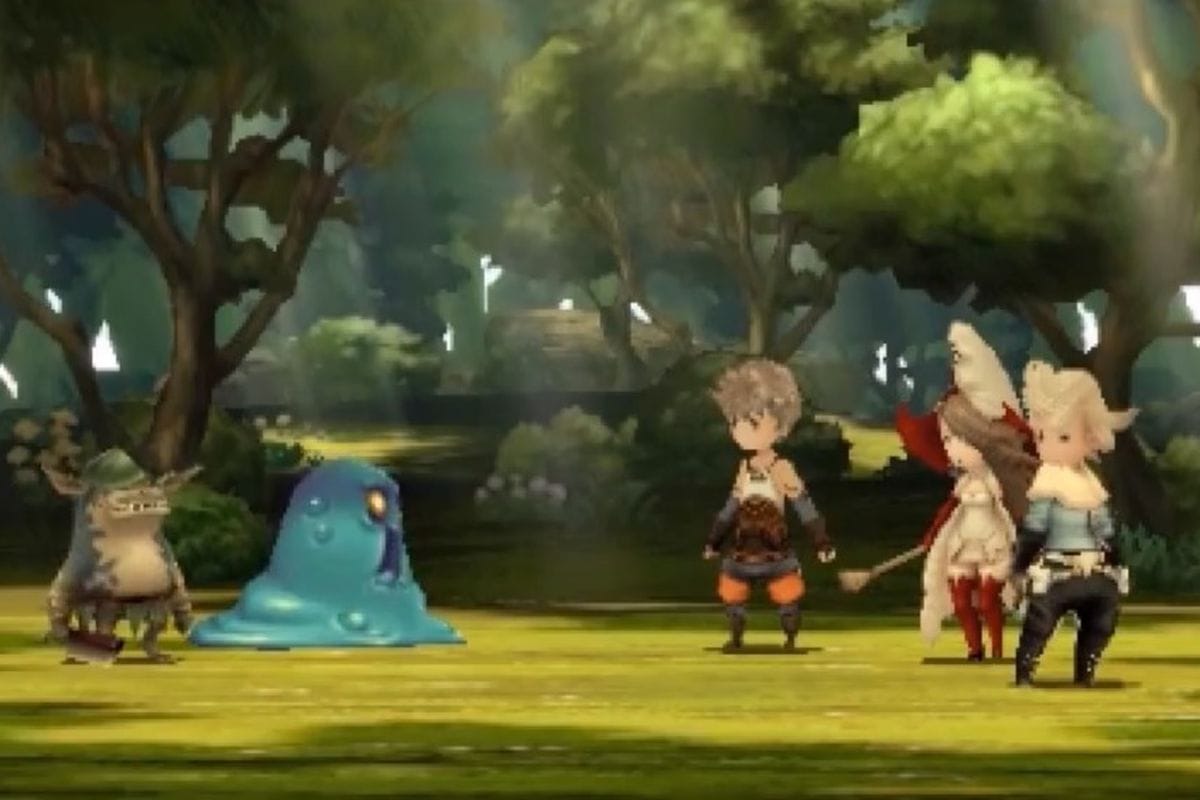
A: That’s part of why I liked Pokémon, Let’s Go!, because it limits random encounters to about ten seconds, or you can just walk around the wild Pokémon you see. With what you’re saying about Bravely Default, it does highlight some problems with the genre. It also recognizes that these games are trying to reach a broader audience. It allows you to play the game you want to, and it lets you grind as much or as little as you want. Some people actually enjoy grinding for some reason!
S: And they’re still playing World of Warcraft.
A: My point is that the system suits more play styles, whereas a game that forces you into random encounters is just catering to fans of the genre. This is bad, because if you just want to experience the story of Bravely Default, you can! The problem is that the story is bad.
S: And that’s what I was hoping would happen with Octopath Traveler, where it looked like it was going to be a more interesting take on the classic formula, but most people said it was pretty much a stock old JRPG. What if, though, Square Enix decided to take all these classic games like Final Fantasy VII and Chrono Trigger and Dragon Quest VIII and added those Bravely Default features to them. You know, for people who just want to enjoy the story and not have to deal with all the nonsense. When people talk about those games, they generally don’t talk about the battles, they talk about how much they love the story and characters. Maybe the visuals in the battles are cool, but people mostly care about the emotional moments that don’t occur during gameplay.
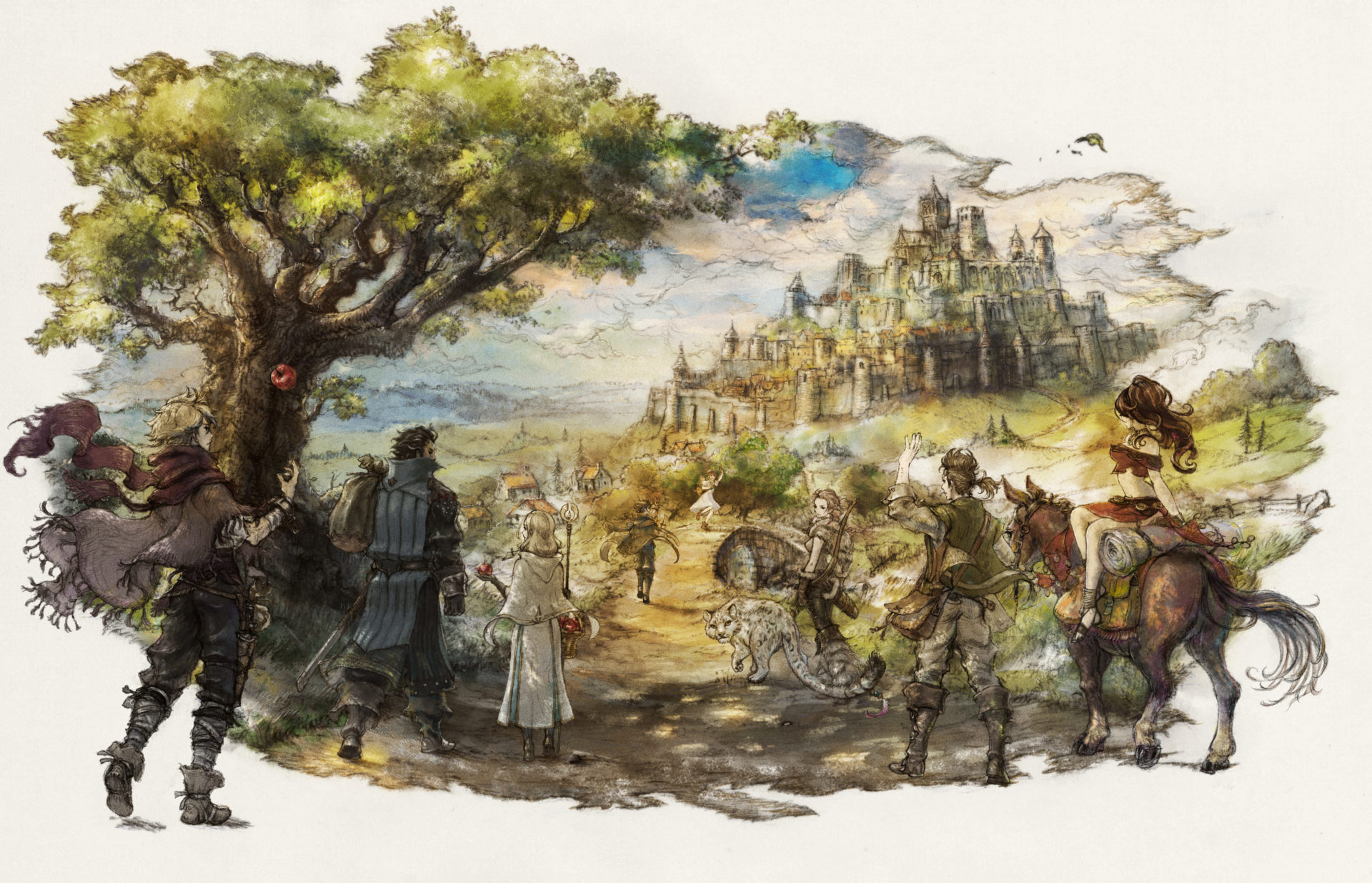
A: That’s why Final Fantasy XV was so fucking good. That game was ALL ABOUT that. It was about a road trip with your buddies, and you get those moments constantly. And they do a lot of changes to make the battle system more real-time, but you go out all day and fight monsters and then at the end, you just talk to your friends about everything that happened. Then every night you set up camp and decide what you’re having for dinner, and that’s so great. They try to work out that maybe you kill a monster and maybe have it for dinner! And when you’re eating dinner, everyone talks about the battle before.
S: Moving on to the next point, what do you think is the future of JRPGs? The first time I really started reading about video games was around 2001, and all these big new games came out, but people were still giving Game of the Year to Final Fantasy X. And I remember before that era, JRPGs were generally at the center of most gaming advancements. It seems our collective idea of what a GREAT game is now, those aren’t really JRPGs anymore (except maybe Nier: Automata). It doesn’t feel anymore like the next big Final Fantasy game will feel like the evolution of video games anymore. The only times now JRPGs seem to be the focus of the community at large now is when they’re remakes of older games or games that try to recreate past formulas.
A: It’s the same thing with movies, too. Everything you see is a remake, a remaster, or inspired by something older. It’s cyclical to a fault.
S: And then we get bored of all the remasters and want something more original.
A: Exactly. One of the things you need to consider is that the way that video games are played in Japan is a lot different than how they’re played here. The handheld market is much bigger in Japan, which is why the Switch is a handheld. The PS Vita was very popular there, as is the 3DS! They both still have some games coming out, most of which are JRPGs, like Persona Q2. So, when you consider that the way people consume games in Japan is different from the way we do it here, we can only talk about the future of the genre in the West because that’s all we know. When I think about the future of the genre, I think more about what new technology can accomplish.
S: Will there be a JRPG in VR?
A: Probably not. That sounds terrible. VR is getting better, but it still has a ways to go. But anyway, I don’t view games like Octopath Traveler as the future of the genre. It was fan service, it was fun, but nothing about the game surprised me.
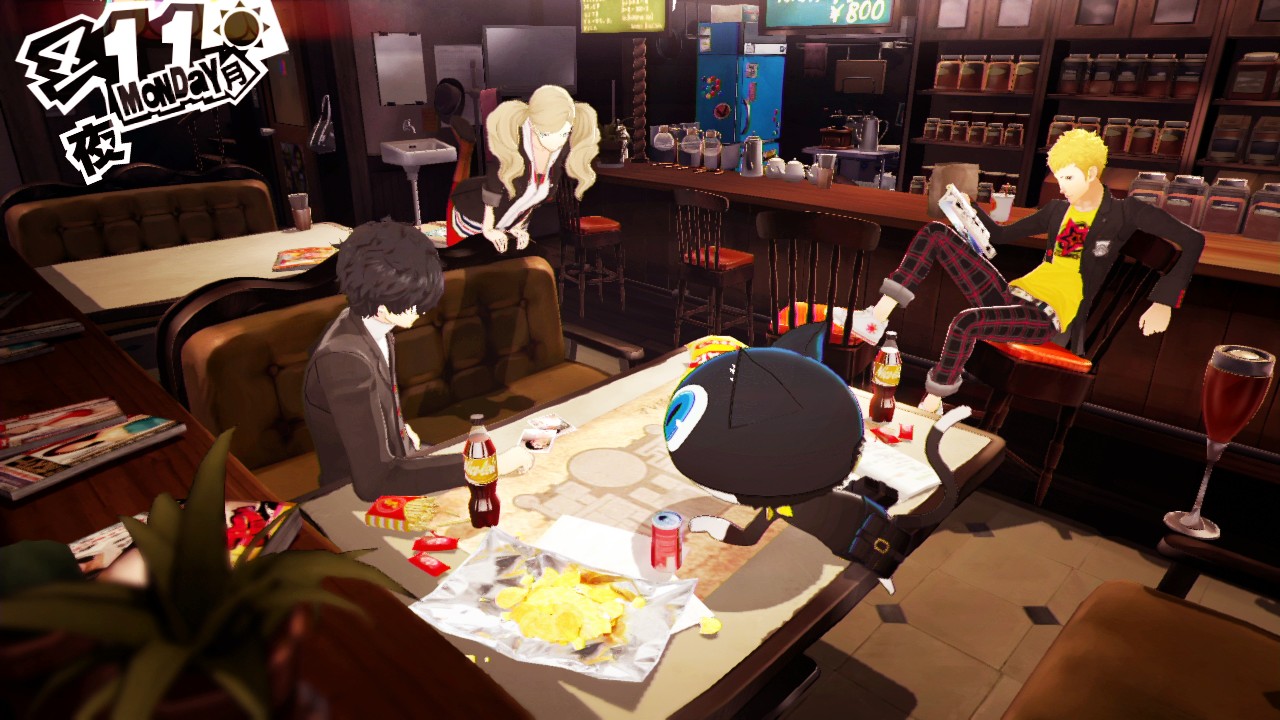
I know I talk about Persona 5 all the time, but I do think that should be the benchmark for JRPGs going forward. It has an autosave function, and saves frequently for the player. I think once I lost a lot of progress, but only because my PlayStation crashed. But also, one of the best things that game did was open up another dungeon at a certain part of the game that’s separate from the main story. You can go into this dungeon essentially for the purpose of grinding, and the game encourages you to go in there every once in a while. But then (SPOILERS) once you finish the main quest, the final boss is actually in that side dungeon! So it actually ties everything in, it makes the side quests worth doing. The dungeon starts off very small and gets bigger as you progress. So the game keeps encouraging you to push further into the dungeon until you hit a wall, and then you can leave and come back later. (END SPOILERS) So, just thoughtful storytelling like that that gives you legitimate reasons to grind. There needs to be some other reward for the time you put in, and that’s where the genre should be going.
S: To me, this is the chief reason The Witcher 3, to me, is the greatest RPG ever made: The only way you can level up is by doing quests, but the quests always make it worth your while. For example, in one quest a dwarf asks you to avenge one of his fellow miners who was killed by a monster. Once you find and kill the monster, you go back to him and he doesn’t feel good about it. He thanks you for performing the task, but doesn’t act like his life is actually any different or that his friend will ever come back. He’s still sad about it, there’s no “Thanks, traveler!” And I like that there was that little level of care put into each little quest. I think JRPGs have those emotional moments, but they’re interspersed with frustrations and junk.
A: I think that’s one of the big things JRPGs can improve on, is that they tell these big grandiose stories, but the smaller stories tend to get ignored. I’m not saying tell a smaller story, but the little things need to be more thought out. It can’t just be a giant monster destroying the entire world. You need to make everything meaningful, especially if it’s a 200-hour game. And it takes a huge amount of effort! That’s why there was ten years between Persona releases. That’s also why it’s so disappointing that I hate Kingdom Hearts 3, since I was really hoping to see an evolution of the franchise, and what I got was Kingdom Hearts 2.9.
Welp, there you have it! An honest and mostly meandering conversation about a game genre that everyone knows and a lot of people love, though others don’t (I’m really trying, guys). Anyway, thanks for checking out what will hopefully be the first of many editions of Punished Chat.
Alexander Toy is a comedian, podcaster, and an avid gamer. You can check out his Bachelor podcast “Bro’s Before Rose” here.
Sam has been playing video games since his earliest years and has been writing about them since 2016. He’s a big fan of Nintendo games and complaining about The Last of Us Part II. You either agree wholeheartedly with his opinions or despise them. There is no in between.
A lifelong New Yorker, Sam views gaming as far more than a silly little pastime, and hopes though critical analysis and in-depth reviews to better understand the medium's artistic merit.
Twitter: @sam_martinelli.


